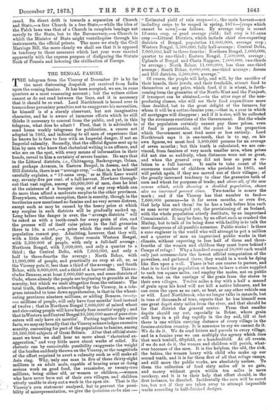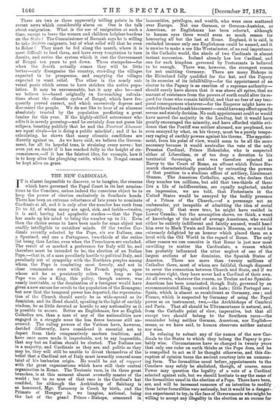THE BENGAL FAMINE.
-who are on the spot, with every means of information in their hands, reveal to him a certainty of severe famine. He says that in the Littoral districts, i.e., Chittagong, Backergunge, Orissa, and perhaps Arracan, in Eastern Bengal, in Assam, and the Hill districts, there is an "average crop,"—that is, as he himself carefully explains, a " 12-anna crop," or as Mark Lane would say, seventy-five per cent. of a full harvest. Nowhere through-
out that vast region, among 60,000,000 of men, does he hint at the existence of a bumper crop, or of any crop which can do more than afford a moderate surplus to the other provinces. Everywhere, without exception, there is scarcity, though in the territories now mentioned no famine and no very severe distress, except such as may be caused by the heavy price at which any surplus in such districts will be gradually sucked up. Long before the danger is over, the "average districts" will be raked as with a tooth-comb for every grain of rice, and the process will of itself raise prices in the full granaries there to 18s. a cwt.,—a price which the residuum of the population cannot pay. Admitting, however, that they will, with a little relief, pay it., there remain Western Bengal, with 3,500,000 of people, with only a full-half average ; Northern Bengal, with 7,000,000, and only a quarter to a third ; the Central Delta, with 7,000,000, and only a half to three-fourths the average ; North Behar, with 11,000,000 of people, and practically no crop at all, or, as the Viceroy puts it, lees than a third of the average ; and South Behar, with 8,000,000, and a third of a harvest also. This ex- cludes Benares, or at least 2,000,000 more, and some districts of Oude, where already the people are beginning to grumble at the scarcity, but which we omit altogether from the estimate. The total truth, therefore, acknowledged by the Viceroy, in a tele- gram intended to tone down apprehension, is that in the wheat- eating provinces nineteen millions, or adding Benares, twenty- one millions of people, will only have four months' food instead of twelve ; that in Northern Bengal 7,000,000 of mixed wheat and rice-eating people will have barely four months' supply ; and that inWestern and Central Benga110,500,000 more of pare rice- eaters will only have six months'. Putting together the entire facts, we maysay broadly that the Viceroy acknowledges excessive scarcity, amounting for part of the population to famine, among 38,500,000 subjects of Great Britain. After that official state- ment we trust we shall hear no more about "rhetorical ex- aggeration," and very little more about works of relief. No rhetoric can by conceivable possibility exaggerate the weight of the burden suddenly thrown on the Viceroy, or the magnitude of the effort required to avert a calamity such as will make all Asia ring. Why, 'only one man in five of these thirty-eight millions is an adult male, capable of bearing arms or doing serious work on good food, the remainder, or twenty-two millions, being either old, or-women or children,—women who have never been out of their own villages, and children utterly unable to sleep out a week in the open air. That is the Viceroy's own statement analysed, but to prevent the possi- bility of misrepresentation, we give the ipsissima verba also :—
" Estimated yield of rain crops—i.e., the main harvest—not including crops to be reaped in spring, 1874—[erops which cannot be sown]—as follows. By average crop is meant 12-anna crop, or good average yield ; full crop is 16-anna crop :—Littoral Districts, which include chief rice-exporting districts of Bengal, population 11,000,000, average crop ; Western Bengal, 3,500,000, fully half-average ; Central Delta, 7,000,000, half to three-fourths ; Northern Bengal, 7,000,000, quarter to one-third ; Eastern Bengal, 7,500,000, average ; Uplands of Bengal and Chota Nagpore, 7,000,000, two-thirds to average ; North Behar, 11,000,000, less than one-third average ; South Behar, 8,000,000, one-third average ; Assam and Hill districts, 3,500,000, average."
Of course, the people will help, and will, by the sacrifice of their hoards, their jewels, and their freeholds, attract food to themselves at any price, which food, if it is wheat, is forth- coming from the granaries of the North-West and the Punjaub, if transport can be obtained,—to the utter rage of the non- producing classes, who will see their food expenditure more than doubled, but to the great delight of the farmers, for whom it will be a cotton-famine year,—that is, a year in which all mortgages will disappear ; and if it is rice, will be collected by the strenuous exertions of the Government. But the whole of the population certainly cannot pay these prices, even if food is procurable, and the point is the proportion which Government must feed more or less entirely. Lord Northbrook says it is one-tenth, that is to say, on his own figures, we must feed 3,800,000 persons for an average of seven months ; but this tenth is calculated, we are con- vinced, from famines of very much smaller area, when prioes did not rise so suddenly, when distances were not so great, and when the general crop did not bear so poor a re- lation to a full harvest. It omits to take count of the enormous number of children who perished in 1865, and will perish again, if they are moved out of their villages ; of the greatly increased tendency to clear the granaries both of corn and wheat for purposes of trade; and above all, of the new census which, while showing a doubled population, shows also an increased poorest class. Two-tenths is nearer the mark ; and if the Viceroy has that number to feed- 7,600,000 persons—be it for seven months, or even five, God help him and them! for he has a task before him such as man never attempted yet, the provisioning of an Ireland, with the whole population utterly destitute, by an improvised Commissariat. It may be done, by an effort such as crushed the Mutiny, but to talk of its being done with facility is to talk the most dangerous of all possible nonsense. Public works Is there a sane engineer in the world who will attempt to put a million and a quarter of men on improvised public works in that climate, without expecting to lose half of them and three- fourths of the women and children they must leave behind ? Camps of refuge ! Why a hundred camps of 38,000 each would only just accommodate the lowest official computation of the powerless, and gathered there, they would in a week be dying like flies upon a wall. There is but one course to pursue, and that is to feed the population at home, to have a store supplied to each ten square miles, and employ the males, not on public works, but on the carriage of the grain from the stores to their own villages. Twelve miles a day with a half a maund of grain upon his head will not kill a native labourer, and he can cross the open as no cart, or boat, or any other vehicle can or will. Lord Northbrook, who no longer talks in maunds, but in tens of thousands of tons, reports that he has himself seen one great depot sixty miles from the river, and that should be for that district the general centre. From that smaller depots should ray out, especially in Behar, where grain will keep in a pit dug rapidly in the dry soil, till at last there is one within carrying distance of every village in the famine-stricken country. It is nonsense to say we cannot do it. We do do it. We do send letters and parcels to every village, and in a famine year we can multiply the agency which does that work tenfold, fiftyfold, or a hundredfold. At all events, if we do not do it, the women and children will perish, what- ever becomes of the men. It is the helpless, the old, the sick, the babies, the women heavy with child who make up our second tenth, and it is for them first of all that refuge camps, and still more the public works, are absolutely useless. To them the collection of food sixty miles off is no gain, and money without grain within ten miles ismere mockery, and it is to their help that effort should, in the first instance, be directed. Incidentally the men will be saved too, but not if they are taken away to attempt impossible works according to half-finished designs.
There are two or three apparently trifling points in the recent news which considerably alarm us. One is the talk about emigration. What is the use of emigration at such a time, except to leave the women and children helpless burdens on the State? The Commissioner of Burmah says he is willing to take 30,000 emigrants, but of what relief will that be even to Behar ? They Must be fed along the march, where it is most difficult to feed them, and have every temptation to turn dacoits, and revive the system which it cost the Government of Bengal ten years to put down. These stampedes—for when the dearth actually comes they will be little better—only disorganise the country, crowding the villages expected to be prosperous, and emptying the villages expected to want relief. The other is the nearly uni- versal panic which seems to have stricken the native popu- lation. It may be unreasonable, but it may also be—and we believe is—based originally on far-reaching calcula- tions about the climatic cycles of Bengal, which have fre- quently proved correct, and which excessively depress and disconcert the people. We do not like to hear of an almanac absolutely trusted by the population predicting a great famine for this year. If the highly-skilled astronomer who edits it is merely guessing—and he certainly does not guess his eclipses, boasting publicly that he and the Nautical Almanac are equal rivals—he is doing a public mischief ; and if he is calculating, he shows that many climatic conditions are directly against us. As we have said, we believe the Govern- ment, for all its hopeful tone, is straining every nerve ; but even yet we doubt if it has reached fully to the height of cir- cumstances,—if it has the faintest idea, for example, how it is to keep alive the ploughing cattle, which in Bengal cannot be kept alive on grass.



































 Previous page
Previous page